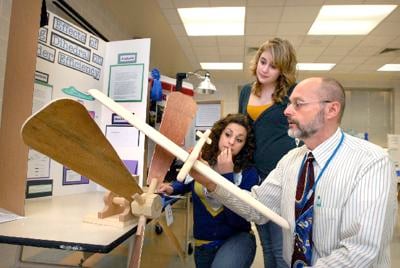Everything About Qualified Mathematics Educators: Their Function in Fostering Student Growth and Success in Mathematics Education And Learning
Certified mathematics instructors are important fit pupils' understanding and appreciation of mathematics. Their deep expertise and reliable training techniques can greatly influence student results. These instructors not just pass on mathematical abilities yet also promote a comprehensive atmosphere that fulfills diverse finding out requirements. As they adopt ingenious techniques, the concern develops: how do these techniques specifically improve student interaction and achievement in math?
The Importance of Competent Mathematics Educators in Education And Learning
Although lots of variables add to student success in maths, the existence of qualified mathematics instructors attracts attention as a critical aspect in cultivating efficient knowing atmospheres. Research constantly shows that students instructed by instructors with strong mathematical histories have a tendency to demonstrate higher degrees of understanding and achievement. Qualified math teachers not only have a deep understanding of mathematical principles however likewise the pedagogical skills required to share complicated ideas in accessible means. They can recognize pupils' specific demands and adapt their mentor strategies accordingly, promoting inclusivity and involvement. Furthermore, their knowledge allows them to produce a favorable classroom atmosphere that motivates risk-taking and resilience in analytic. This helpful setting fosters a development frame of mind among students, improving their self-confidence and motivation in mathematics. Generally, certified math instructors play an essential duty in shaping students' perspectives toward mathematics, eventually affecting their academic trajectories and future chances.
Trick Top Qualities of Reliable Mathematics Educators
Efficient mathematics instructors possess several key qualities that enhance their teaching effectiveness. These include deep subject expertise, strong interaction abilities, and flexible teaching techniques that accommodate diverse learning requirements. Acknowledging and growing these qualities can considerably influence trainee understanding and engagement in maths.
Deep Subject Expertise
While a solid pedagogical method is vital, deep subject expertise continues to be a cornerstone of effective math instructors. Such expertise makes it possible for instructors to recognize mathematical ideas extensively and to prepare for student misconceptions. Educators with a solid grasp of math not just supply web content with self-confidence yet likewise attach numerous subjects, promoting a richer knowing setting. They are geared up to apply diverse teaching approaches that deal with various discovering designs, making complicated ideas much more easily accessible. Furthermore, deep subject knowledge empowers teachers to participate in purposeful conversations with pupils, encouraging essential thinking and analytical skills. Ultimately, the deepness of recognizing that math educators possess greatly influences trainees' academic development and success in mathematics, laying a strong foundation for future understanding.

Solid Interaction Skills
Deep subject understanding alone wants for promoting an effective knowing environment in mathematics; solid interaction abilities are equally necessary for effective math educators. These abilities allow instructors to share intricate concepts in accessible methods, making sure that pupils grasp foundational concepts. Effective communication entails not just clarity yet likewise the capability to proactively pay attention, encouraging student engagement and dealing with mistaken beliefs. By fostering an open discussion, teachers develop an encouraging class environment where trainees feel comfortable asking inquiries and expressing their thoughts. In addition, solid communicators can adjust their language and explanations to match varied understanding styles, boosting pupil involvement and understanding. Ultimately, efficient interaction bridges the space in between a teacher's understanding and a pupil's understanding, considerably impacting scholastic success in maths.
Flexible Training Methods
A range of adaptive teaching methods are vital for reliable math educators aiming to fulfill the varied requirements of their pupils. These techniques enable instructors to customize their instruction based on specific understanding interests, abilities, and styles. qualified math teachers. Methods such as differentiated instruction, where teachers customize web content, procedure, or item, assistance address differing effectiveness levels. In addition, including modern technology and interactive devices can enhance interaction and help with customized understanding experiences. Formative assessments permit instructors to keep track of progression and readjust mentor methods as necessary. Collective group job promotes peer learning, cultivating a helpful atmosphere. By employing these flexible methods, mathematics teachers can produce comprehensive class that motivate all students to prosper and accomplish their academic objectives, eventually fostering a love for maths
Cutting-edge Mentor Methods Used by Math Educators
As teachers look for to engage trainees better, cutting-edge training methods have actually emerged as a prime focus in mathematics class. These techniques intend to boost understanding and retention of mathematical concepts. One popular approach is using innovation, such as interactive software program and online simulations, which enables trainees to envision complicated troubles and obtain instant feedback.Additionally, project-based learning motivates partnership and real-world application of mathematics principles, promoting crucial believing abilities. Gamification, where math concepts are integrated right into game-like settings, has also gotten appeal, making finding out more pleasurable and inspiring for students.Moreover, differentiated instruction tailors lessons to fit differing ability degrees, guaranteeing that all trainees can proceed at their very own rate. By employing these innovative techniques, mathematics teachers create dynamic understanding experiences, ultimately promoting higher pupil growth and accomplishment in maths.
Developing Inclusive Learning Settings
Producing comprehensive understanding environments in mathematics education involves carrying out diverse knowing methods and fostering joint group tasks. These strategies satisfy the varied demands of pupils, making sure that every person has the possibility to engage and be successful. By focusing on inclusivity, mathematics educators can grow a classroom ambience that sustains all students.
Diverse Learning Methods
While numerous instructors endeavor to foster comprehensive discovering environments, implementing varied knowing strategies is vital for effectively reaching all pupils. These strategies encompass a series of teaching techniques customized to suit differing discovering backgrounds, capabilities, and designs. Incorporating aesthetic help, manipulatives, and innovation can engage pupils that might have a hard time with traditional instruction. In addition, distinguished guideline permits instructors to modify analyses and assignments, making certain that every pupil can access the educational program at their own level. Culturally receptive pedagogy also plays a substantial duty in recognizing and valuing the varied experiences of trainees, thus improving their link to the material. By utilizing these varied learning methods, certified mathematics teachers can create an encouraging atmosphere where all students are equipped to do well in maths.
Collaborative Group Activities

The Influence of Professional Mathematics Teachers on Student Accomplishment
The presence of qualified math instructors significantly affects trainee achievement, as reliable instruction can link spaces in understanding and foster a positive discovering atmosphere. Research study indicates that trainees educated by seasoned instructors show higher levels of efficiency in mathematical principles contrasted to their peers. Qualified mathematics educators have a deep understanding of mathematical material, enabling them to present material in varied manner ins which deal with different learning designs. This versatility not just boosts understanding however additionally boosts trainee confidence in their abilities.Moreover, certified instructors typically use formative assessments to keep an eye on trainee progress, enabling prompt interventions when necessary. Their capacity to develop engaging lessons motivates pupil participation and advertises a development way of thinking. Because of this, the impact of qualified math educators extends past simple scholastic efficiency; it cultivates a feeling of curiosity and durability in pupils, eventually leading to enhanced end results in maths and a more powerful structure for future learning.
Approaches for Engaging Trainees in Math
Engaging pupils in math requires a multifaceted technique that incorporates varied strategies to catch their rate of interest and enhance understanding. One efficient approach is making use of real-world applications, enabling trainees to see the significance of mathematical principles in day-to-day life. Integrating technology, such as interactive software program and on-line sources, can likewise cultivate engagement by supplying vibrant learning experiences.Group work motivates collaboration, enabling pupils to pick up from each other and establish analytical skills in an encouraging setting. In addition, including games and hands-on activities can make learning even more enjoyable and accessible.Differentiated direction satisfies various learning designs, making certain that all pupils can attach with the product. Giving timely feedback assists students recognize their development and locations for enhancement, cultivating a growth state of mind. By utilizing these approaches, teachers can develop an appealing mathematics class that promotes pupil development and success.
The Role of Expert Development in Enhancing Mathematics Training Abilities
While several instructors acknowledge the value of efficient mentor techniques, professional advancement plays a vital function in boosting see here now math mentor skills (qualified math teachers). Continuous training possibilities permit instructors to stay current with instructional innovations, mathematical material, and technical devices. Workshops and workshops supply forums for instructors to collaborate, share ideal techniques, and discuss obstacles they experience in the classroom.Furthermore, specialist advancement fosters a growth state of mind amongst teachers, motivating them to review their methods and adjust their strategies based on pupil requirements. This ongoing learning process not just enhances teachers' mathematical understanding but likewise furnishes them with ingenious instructional techniques that can result in enhanced trainee engagement and achievement.Ultimately, a structured professional advancement program can greatly impact the top quality of math education and learning, making sure that teachers are well-prepared to influence and lead their students toward success in maths
Often Asked Concerns
What Certifications Are Needed to End Up Being a Mathematics Educator?
To come to be a mathematics educator, individuals commonly require a bachelor's level in mathematics or education, mentor accreditation, and a solid understanding of mathematical concepts. Added credentials may include specialized training in rearing and class management abilities.

Exactly How Do Mathematics Teachers Assess Pupil Progress in the Class?
Math educators assess trainee development through various approaches, including tests, projects, and tests (qualified math teachers). They additionally utilize empirical analyses and pupil participation to evaluate understanding, changing direction based on individual and team efficiency to boost finding out end results
What Obstacles Do Math Teachers Commonly Face?
Math educators typically face challenges such as varying trainee ability levels, minimal sources, curriculum restrictions, and the requirement to engage students effectively. Additionally, they commonly encounter pressure to boost standardized test scores and handle class habits.
Just How Can Parents Support Their Youngster's Mathematics Education and learning?
Moms and dads can sustain their kid's math education and learning by providing a helpful understanding environment, involving in math-related activities, encouraging a favorable mindset towards challenges, and keeping open interaction with instructors to monitor progression and address issues.
What Resources Are Available for Mathematics Teachers to Enhance Their Abilities?
Different sources are available for mathematics educators, consisting of on-line programs, specialist advancement workshops, peer cooperation groups, educational internet sites, and training journals. These devices boost instructional methods, grow subject knowledge, and eventually enhance trainee learning results in mathematics. Certified mathematics teachers are essential in shaping pupils' understanding and recognition of mathematics. Lots of elements add to student success in mathematics, the presence of qualified math instructors stands out as a critical element in cultivating reliable understanding atmospheres. Additionally, certified mathematics educators promote these communications by tactically grouping trainees, making sure that each team has a mix of ability degrees and histories. The presence of qualified math instructors significantly affects pupil accomplishment, as effective instruction can connect spaces in understanding and cultivate a favorable understanding atmosphere. Mathematics educators frequently deal with obstacles such as varying trainee skill levels, minimal sources, curriculum constraints, and the demand to involve pupils properly.